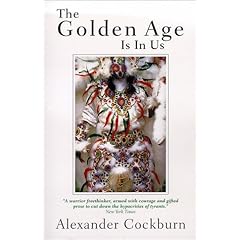 I fell asleep last night drawn down by Tarik O’Regan’s Voices, recent choral works which were sufficiently startling to delay sleep by an hour, and Alexander Cockburn’s The Golden Age Is In Us, which I’ve no intention of ever completing, or ever fully abandoning. I find Cockburn’s diary -- essays in short form, off-hand analysis, quick attacks, clear-eyed reads -- strangely soothing. The entries cover the late 80s and early 90s. I remember some of it, Nancy’s drug campaign, Arafat on the White House lawn; and have since learned about other events chronicled therein (SDI, Satanic panic), and know almost nothing about tiny liberation movements in Hawai'i, or, for that matter, in the broccoli fields of Watsonville, California. This last is of extra interest due to the gravity of narcissism -- Julie and I recently drove past Watsonville, thus endowing the little town with our vast worldly importance.
I fell asleep last night drawn down by Tarik O’Regan’s Voices, recent choral works which were sufficiently startling to delay sleep by an hour, and Alexander Cockburn’s The Golden Age Is In Us, which I’ve no intention of ever completing, or ever fully abandoning. I find Cockburn’s diary -- essays in short form, off-hand analysis, quick attacks, clear-eyed reads -- strangely soothing. The entries cover the late 80s and early 90s. I remember some of it, Nancy’s drug campaign, Arafat on the White House lawn; and have since learned about other events chronicled therein (SDI, Satanic panic), and know almost nothing about tiny liberation movements in Hawai'i, or, for that matter, in the broccoli fields of Watsonville, California. This last is of extra interest due to the gravity of narcissism -- Julie and I recently drove past Watsonville, thus endowing the little town with our vast worldly importance.Cockburn’s point is that Watsonville is plenty stocked with worldly importance already. Here he’s writing about Frank Bardacke, a long-time radical writer residing there. Bardacke’s been on my mind, though the most I’ve read of him are his letters to Cockburn reproduced in Golden Age. But JoAnn W. tells me she is editing his giant manuscript on the UFW and that Bardacke spent ten years on this, and knows it as well as anyone in the world.
 Cockburn is writing about Bardacke at the beginning of that project, I'm guessing, flush with the power of perception, detecting in Watsonville’s dusty streets, steeple-less church, seemingly blank broccoli fields all the forces of political economy, empire building, international commerce, money, sex, death, etc. Bardacke is apparently not interested in some Winesburgian distillation – he works in sweep and scope, inverting the cliché “All politics are local”: the local is the political, at the farthest reaches of the latter word’s definition.
Cockburn is writing about Bardacke at the beginning of that project, I'm guessing, flush with the power of perception, detecting in Watsonville’s dusty streets, steeple-less church, seemingly blank broccoli fields all the forces of political economy, empire building, international commerce, money, sex, death, etc. Bardacke is apparently not interested in some Winesburgian distillation – he works in sweep and scope, inverting the cliché “All politics are local”: the local is the political, at the farthest reaches of the latter word’s definition.Which brings me to the spark for this entry: One page of Middlemarch, read while brushing my teeth. Rosamond is pressing her father, Mayor Vincy, to allow her to marry Dr. Lydgate. Vincy has turned against his earlier generous spirit. “I hope he knows I shan’t give anything – with this disappointment about Fred, and Parliament going to be dissolved, and machine-breaking everywhere, and an election coming on –” “Dear papa! what can that have to do with my marriage?” “A pretty deal to do with it!”
Indeed. It’s no discovery that Eliot’s “pastoral study” is large in scope, but this first mention of “machine-breaking” -- workers' sabotage -- underlines the novel’s interest in the relationship of economies large and small to the usual stuff of money, sex, death, etc. Eliot no more subsumes the concerns of the former than would her characters in ordinary life. And yet neither does she burden them with explanatory speeches, representative positions, and such. One of the lessons of Middlemarch is that positions -- class, political, medical, even -- are like musical tones, only of significance in their relation to other tones and only stable if a phrase were to repeat itself endlessly.
